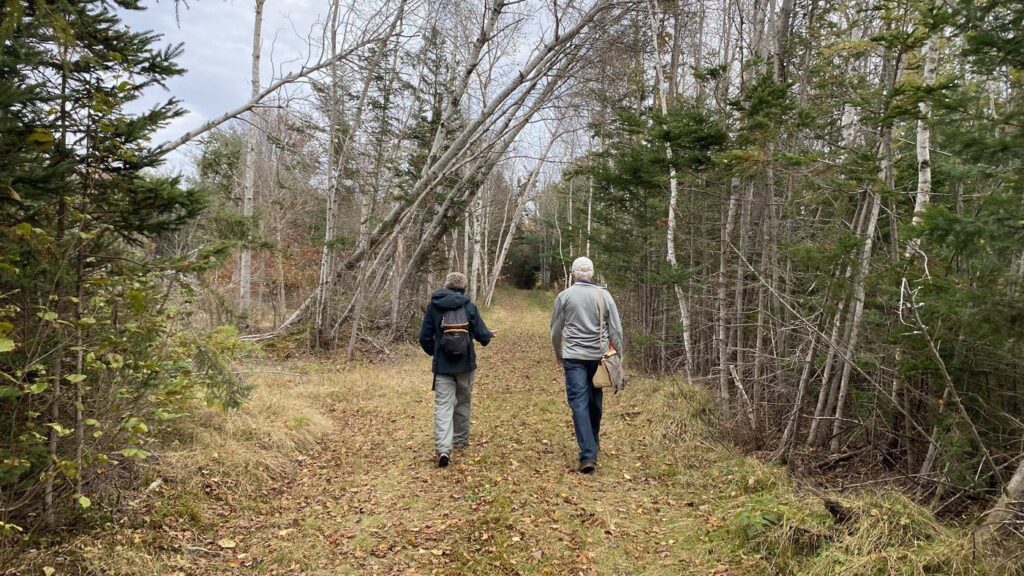
Industry News
News
P.E.I. woodlot owners ask government for support from Fiona
November 16, 2023 By Caitlin Coombes, Local Journalism Initiative Reporter
 Wanson Hemphill, right, led woodlot owners through his Covehead property earlier this month, where the damage from post-tropical storm Fiona is still visible more than a year later. Photo: Caitlin Coombes/Local Journalism Initiative.
Wanson Hemphill, right, led woodlot owners through his Covehead property earlier this month, where the damage from post-tropical storm Fiona is still visible more than a year later. Photo: Caitlin Coombes/Local Journalism Initiative. Woodlot owners across P.E.I. are facing the continued aftermath of post-tropical storm Fiona and are asking the province for increased support.
Despite support from the Forest Enhancement Program (FEP) woodlot owners are still struggling to heal their woodlots more than a year after the post-tropical storm.
This lack of financial assistance has caused massive delays and decreased recovery work in woodlots across the province.
“The quicker we can get it down, the better, there’s never enough woody debris,” Wanson Hemphill, a board member of the Prince Edward Island Woodlot Owners Association, told SaltWire on Nov. 4.
Hemphill, who has a woodlot in Covehead, is focusing the cleanup of his woodlot on removing dangerous trees to improve the health of his forest, as well as replanting hardwood and softwood as seeds and saplings become available.
“Our best friend in biodiversity is Mother Nature, and she doesn’t like open spaces.” – Wanson Hemphill
Hemphill hosted nature walks throughout 2023 for woodlot owners, leading attendees through his woodlot to display the damage mass tree losses cause to the forest.
“Our best friend in biodiversity is Mother Nature, and she doesn’t like open spaces,” Hemphill said addressing participants of the Nov. 4 nature walk, the final walk of 2023.
PEIWOA
The Prince Edward Island Woodlot Owners Association (PEIWOA) represents over 100 woodlot owners across the province and stands as the largest organization for woodlot owners in P.E.I.
A requirement that an income be noted at least once every three years disqualified most woodlot owners in P.E.I. from receiving financial support from the disaster relief provided by the Red Cross.
“It was disappointing for us to have to not receive attention as an industry because of that definition. We need to sit down and define precisely what an economic woodlot business is,” project manager Barry Murray told SaltWire in a recent interview.
The PEIWOA went before the standing committee on natural resources and environmental sustainability last month, recommending increased support and funding for woodlot owners after Fiona.
One of the PEIWOA’s primary recommendations to the committee was to increase funding for the Forest Enhancement Program.
Murray said some members of the PEIWOA believe it does not have the funds to support the woodlot owners, which is delaying the cleanup even further.
“It needs a new injection of funding, a lot of the work is not done yet,” Murray said.
Murray also said the association estimated that woodlot owners across the province are facing $40 million in potential financial loss.
This number only accounts for the lost potential income of the trees damaged by Fiona and does not account for the repair and recovery work needed for Islanders who prioritize biodiversity in their woodlots.
“We’re still absorbing the shock of Fiona,” Murray said.
The PEIWOA estimates only 20 per cent of woodlot owners in P.E.I. participate in the Forest Enhancement Program, leaving the rest of the woodlot owners without help post-Fiona.
Caitlin Coombes is a Local Journalism Initiative reporter for The Guardian.
Print this page